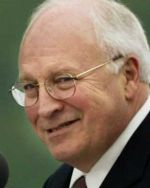If Bill Clinton was the first black President -- a moniker he relished -- then George W. Bush is the first Jewish President. After first disengaging from the Israeli-Palestinian peace negotiations and refusing to even lay eyes on Yasser Arafat, Bush went on to give Israeli Prime Minister and best Mideast buddy Ariel Sharon virtual carte blanche in his crackdown on the suicide-bombing Palestinans and then followed the advice of his fiercely pro-Israel neocon advisers and went to war in Iraq.
Matthew Brooks, executive director of the Republican Jewish Coalition, calls Bush "the most pro-Israel President in history."
[...]
Now the FBI is investigating whether a Pentagon official in the office of neocon Defense Under Secretary Douglas J. Feith, identified by The Washington Post as Lawrence A. Franklin, passed classified information about American policy toward Iran to Israel through a pro-Israel lobbying group. The obvious question about the probe, which has been reportedly going on for a year but was first reported by CBS last week, is this: As details come out, will Bush's tilt toward Israel hurt him in November? The less obvious question is: Will the scandal help him even more with some Jewish voters?
Certainly the Administration isn't downplaying the vigorous support of the American Israel Public Affairs Committee, the lobbying group implicated in the spy scandal. At a pre-convention event on Sunday afternoon co-sponsored by AIPAC [which vehemently denies allegations that it passed sensitive documents to Israel] and attended by almost 2,000 members of the New York Jewish community, the Republicans rolled out the big guns: Mayor Michael Bloomberg, Senate Majority Leader Bill Frist, and former Mayor Rudy Giuliani. UJA Federation of New York President Morris W. Offit introduced Bush campaign chief Ken Mehlman by saying: "We are honored that President Bush's campaign is being managed by one of us."
At first blush, officials close to the investigation say, Franklin seemed an unlikely suspect: he was described as a midlevel policy "wonk" with a doctorate who had toiled for some time on Mideast affairs. Yet he had previously worked at the Defense Intelligence Agency, and there was at least one other aspect to his background that caught the FBI's attention: although Franklin was not Jewish, he was an Army reservist who did his reserve duty at the U.S. Embassy in Tel Aviv.
[...]
FBI counterintelligence agents began tracking him, and at one point watched him allegedly attempt to pass a classified U.S. policy document on Iran to one of the surveillance targets, according to a U.S. intelligence official. But his alleged confederate was "too smart," the official said, and refused to take it. Instead, he asked Franklin to brief him on its contents�and Franklin allegedly obliged. Franklin also passed information gleaned from more highly classified documents, the official said. If the government is correct, Franklin's motive appears to have been ideological rather than financial. There is no evidence that money changed hands. "For whatever reason, the guy hates Iran passionately," the official said, referring to the Iranian government.
NEWSWEEK's efforts to reach Franklin or a lawyer representing him were unsuccessful. But a close friend, Michael Ledeen of the American Enterprise Institute*, said he believes the charges against Franklin are "nonsensical." Officials say that Franklin began cooperating about a month ago, after he was confronted by the FBI. At the time, these officials say, Franklin acknowledged meetings with the Israeli contact. Law-enforcement officials say they have no evidence that anyone above Franklin at the Pentagon had any knowledge of his activities.
Israeli officials say the FBI probe cannot be taken seriously because Israel learned its lessons about spying on its closest ally in 1985 when naval intelligence analyst Jonathan Pollard was caught spying for Israel.
"Since [the] Pollard case there was a clear and firm decision not to spy against the United States government or in the United States, and therefore, I am 100 percent confident that there is no Israeli involvement in this case," said Yuval Steinetz, who chairs the Foreign Affairs and Defense Committee in the Israeli parliament.
But some Israeli analysts believe that no matter what the outcome of the FBI investigation may be, the affair could harm Israeli-American relations.
Security analyst, Shlomo Brum, of Tel Aviv's Jaffee Center for Strategic Studies, says no matter what the facts are a certain perception is there. "It may increase the perception among some people that Israel is misusing its relationship with the USA and that Israel is not a faithful ally, etc. etc," he said.
Israeli analysts do agree that the affair will not hurt bilateral relations in the long-term.
"Since [the] Pollard case there was clear and firm decision not to spy against the United States government or in the United States, and therefore I am 100 percent confident that there is no Israeli involvement in this case," he said.
-
Prime Minister Ariel Sharon�s office issued a denial, saying �Israel does not engage in intelligence activities in the US.�
-
A statement from Prime Minister Ariel Sharon's office late Saturday night said the government was not aware of the incident. The statement said, "Israel is not employing any intelligence assets in the United States."
That position was elaborated on by Yuval Steinetz, chairman of the Foreign Affairs and Defense Committee in the Israeli parliament. He said Israel decided to halt all espionage activities against the United States following the arrest and conviction of Jonathan Pollard, who was caught passing secrets to Israel nearly 20 years ago.
"Since [the] Pollard case there was clear and firm decision not to spy against the United States government or in the United States, and therefore I am 100 percent confident that there is no Israeli involvement in this case," he said.
-
*"...it has emerged as one of the leading architects of the Bush administration's foreign policy. AEI rents office space to the Project for the New American Century, one of the leading voices that pushed the Bush administration's plan for "regime change" through war in Iraq. AEI reps have also aggressively denied that the war has anything to do with oil..." - disinfopedia

 Yunesi accused the United States and some European countries of hiring members from groups linked to Al Qaeda and trying to help them infiltrate Iran and carry out sabotage and terrorist operations. He didn't name the European states.
Yunesi accused the United States and some European countries of hiring members from groups linked to Al Qaeda and trying to help them infiltrate Iran and carry out sabotage and terrorist operations. He didn't name the European states.




 Karl Rove
Karl Rove






 At least
At least 